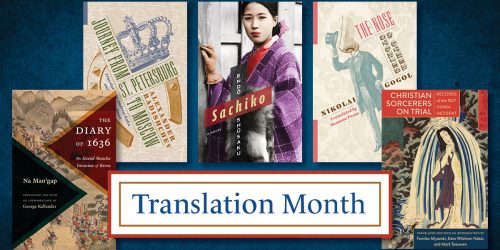Andrew Kahn and Irina Reyfman on Alexander Radishchev’s Journey from St. Petersburg to Moscow

“Combining profound linguistic sophistication with enviable literary style, Andrew Kahn and Irina Reyfman, two of today’s most esteemed scholars of Russian literature, have produced the definitive translation of Radishchev’s classic revolutionary cri de coeur.”
~Douglas Smith, author of Rasputin: Faith, Power, and the Twilight of the Romanovs
We’re wrapping up National Translation Month with a guest post by Andrew Kahn and Irina Reyfman, the translators of Alexander Radishchev’s Journey from St. Petersburg to Moscow in our Russian Library series. In this post, Kahn and Reyfman discuss the role of the travelogue in the eighteenth century and Radishchev’s motivation for writing this book.
Check out our National Translation Month overview to read an excerpt and for a chance to win a copy of this!
• • • • • •
“Each person is born into this world the equal of any other.”
This line opens a speech in the court trial of a family of serfs who killed their master in self-defense. This line and other statements about inequality, human rights, and social justice, are of crucial importance in Alexander Radishchev’s Journey from St. Petersburg to Moscow (1790). These ideas make this travelogue both a work ahead of its time in Russia, published seventy years before the Great Reforms of the 1860s, and a work that is completely contemporary to its time because the ideals expressed by Radishchev’s narrators are consistent with progressive movements of the 1790s. An experienced civil servant, Radishchev could have written out his positions on agrarian reform and serfdom in a treatise or a formal report. Instead, he chose to cast his radical critique in the form of a journey. He published this work on a hand-press with dire personal consequences, facing first arrest and then exile. What may have been explosive then—and what is most relevant now—was not Radishchev’s policies on serfdom (he offered none in this work) but rather the arguments for human rights he espouses.
The eighteenth century was a great age of journeys, real and fictional. Fictional journeys provided defamiliarized perspectives on beliefs, attitudes, and customs as socially constructed. While the Enlightenment generally promoted moral universals, it also relativized social practices, and by experiencing reality first-hand, travelers commented anthropologically on variations of ways of life near and far; dietary practices, marriage arrangements, sexual taboos, and human rights were thrown in the spotlight, indications of local customs that showed differences and consistencies in the application of universal human tendencies. The pioneering work in travel as comparative social science was Montesquieu’s Persian Letters (Lettres persanes, 1721), and many later journeys dressed up philosophical enquiry as adventure. The Supplement to the Journey of Bougainville (Supplément au voyage de Bougainville, 1796), a masterpiece by Denis Diderot, considers the state of nature in which eighteenth-century Tahitans lived as a society. Polygamous family structures were naturally communist in property sharing, while colonization by outsiders wrought disease and poverty on the native population. Captain James Cook may have been a hero as an explorer, but from another standpoint his settlers had brought destruction. Similar in its use of travel as a vehicle for social critique was Guillaume Thomas Raynal’s A Philosophical and Political History of the Two Indies (Histoire philosophique et politique des établissements et du commerce des Européens dans les deux Indes, 1770). A tale of travels full of tirades against colonial exploitation, unfair trade practices, and slave rebellions in the East Indies, South America, and elsewhere, the book was banned in France in 1779 and burned by France’s public executioner. Raynal escaped arrest by going first to the court of Frederick the Great of Prussia and then to St. Petersburg where Catherine the Great offered him a warm reception. Raynal’s book was one that Radishchev had in his library and from which he quoted.
“Fictional journeys provided defamiliarized perspectives on beliefs, attitudes, and customs as socially constructed.”
In his travelogue, Radishchev followed the example of other distinguished European writers in representing the societal ills and governance issues besetting his country; he uses a mixed form that combines novelistic stories, treatise-like speeches, and allegories in a way that is both specific and universal, realistic and abstract, targeting troubles that existed in one place but could happen in any society. This is the tradition in which Radishchev’s Journey from St Petersburg should be read. His journey follows along a real postal route, with grumpy stationmasters and insufficient postal-horses lending verisimilitude. His hero offers an outsider’s perspective on local practices and, like Diderot’s naturalist in Tahiti, he is particularly fascinated by the treatment of women, arranged marriages, sexual exploitation, and the ravages of venereal disease. And in the manner of Laurence Sterne (as well as of Nikolai Karamzin, whose work Radishchev may have read), Radishchev’s hero is brimming with virtue and tears. A readiness to weep may look quaint now, but in eighteenth-century literary symbolism, weeping was proof of a human capacity for empathy. Empathy, for the most important social theorists of the period such as Lord Kames and Adam Smith, is the bedrock of natural justice that societies must try to encode in law if they are to prevent discord and rebellion fomented by colonial and internal exploitation.
Yet what was Radishchev’s motivation to write this work? Russia had undergone multiple reforms during Catherine the Great’s long reign. In 1790, however, Catherine was seen, rightly or wrongly, as aged and more vulnerable to court factions and intrigues. Furthermore, there had been no progress on the question of serfdom just as the French Revolution inspired popular movements on a massive scale across Europe and the globe. Under some individual landholders, the plight of the serfs had improved. But for the vast majority of serfs (and we are talking about more than 90 percent of the Russian Empire’s population), economic hardship was constant and unalleviated, exacerbated by other societal woes such as forced conscription and sexual exploitation—all topics that come up in this work.
“A prohibited book, the Journey’s radicalism was seen as implicitly revolutionary.”
A prohibited book, the Journey’s radicalism was seen as implicitly revolutionary. But this is contestable. Instead, the Journey’s radicalism might be better understood again in the context of its time. Unlike Captain Cook or Josiah Banks, for example, Radishchev did not write about scientific or exploratory journeys. (His letters from Siberia, however, show how observant he was about local flora and fauna.) His work places him closer to Thomas Paine’s Rights of Man and Raynal’s Philosophical and Political History in taking a human rights–based perspective, and how Russian serfs are presented as equal members of society is one of the most striking positions adopted in the Journey. Peasants’ lives matter not just out of economic efficiency but because of natural justice, an argument made in the speech of a nobleman who justifies acts of violence as self-defense in the aforementioned trial of the two serfs.
In these lines, at a time when questions of economic equality and race are making headlines across the United States and around the world, one can see the relevance of Radishchev’s work to our present moment, especially in translation. The speech below uses a familiar vocabulary, one that reflects the Enlightenment values enshrined in other contemporary documents such as the American Constitution and the U.S. Bill of Rights:
Man considered, therefore, outside society is a being dependent on nobody else for his own deeds. But he puts a limit on these, consents not to subordinate himself to his own will alone, and becomes obedient to the commands of other human beings, in a word becomes a citizen. For the sake of what cause does he restrain his desires? For what purpose does he set a power over himself? Unlimited in the exercise of his willpower, why does he limit it through obedience?—For his own sake,—says reason.—For his own sake,—says an inner voice.—For his own sake,—says wise legislation. It follows that where it is not in his interest to be a citizen there is no citizen. It follows, therefore, that whoever wants to deprive him of the advantage of being a citizen is his enemy. He seeks in the law defense and retribution against his enemy. If the law either does not have the power to defend him or does not wish to do so, or lacks the power to help him immediately in his present woe, then the citizen uses his natural right of defense, preservation, welfare. For the citizen, insofar as he has become a citizen, does not cease to be a person whose first duty, stemming from his organism, is preservation, defense, welfare.







